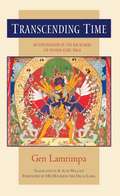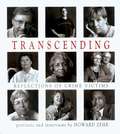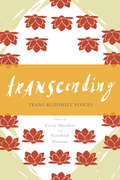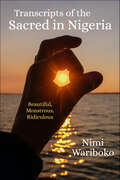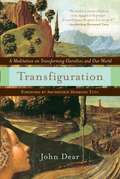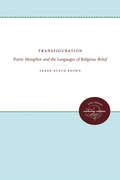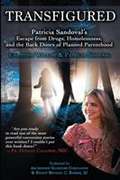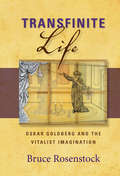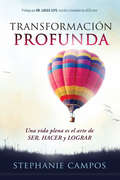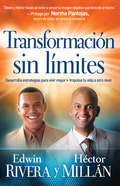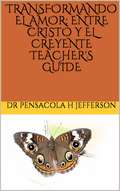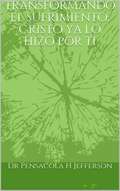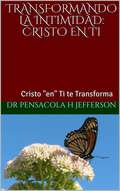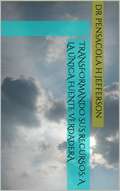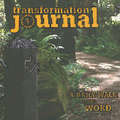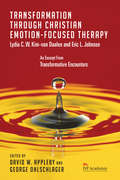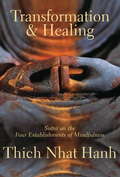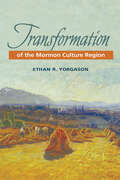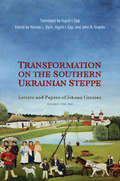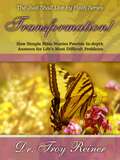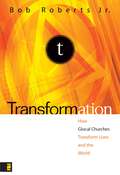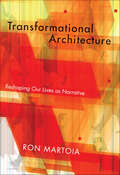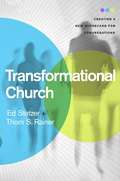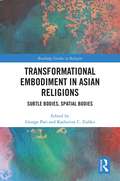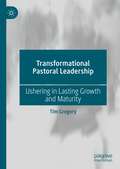- Table View
- List View
Transcending Time
by His Holiness the Dalai Lama B. Alan Wallace Gen Lamrimpa Pauly B. FitzeInspired by years of scholarly training and decades of solitary retreat, Tibetan monk Gen Lamrimpa offers a concise overview of all phases of the Kalachakra practice: the preliminaries, the initiation, and finally, the stages of generation and completion. With remarkable clarity, he makes the Six-Session Guruyoga practice accessible to all practitioners, and deepens our understanding and appreciation of this sublime teaching of the Buddha. Gen Lamrimpa begins this eminently practical explanation by emphasizing the importance of a compassionate motivation for spiritual practice. He then explores the nature of suffering and the cycle of existence that traps all living beings, and concludes with a detailed account of the Six-Phase Yoga, which is meant to be recited and contemplated three times during the day and three times at night. Alan Wallace's introduction illuminates both Kalachakra's rich history and Gen Lamrimpa's unique contribution to our understanding. This book provides a clear explanation of Kalachakra as set forth within the context of the Six-Session Guruyoga, a daily meditation practice for initiates. Transcending Time presents all phases of Kalachakra practice--the preliminaries, the initiation, and finally, the stages of generation and completion.
Transcending: Reflections Of Crime Victims
by Howard ZehrAre victims of crime destined to have the rest of their lives shaped by the crimes they've experienced? ("What happened to the road map for living the rest of my life?" asks a woman whose mother was murdered.) Will victims of crime always be bystanders in the justice system? ("We're having a problem forgiving the judge and the system," says the father of a young man killed in prison.) Is it possible for anyone to transcend such a comprehensively destructive, identity altering occurrence? ("I thought, I'm going to run until I'm not angry anymore," expresses a woman who was assaulted.) Howard Zehr presents the portraits and the courageous stories of 39 victims of violent crime in Transcending: Reflections of Crime Victims. Many of these people were twice-wounded: once at the hands of an assailant; the second time by the courts, where there is no legal provision for a victim's participation. "My hope," says Zehr, "is that this book might hand down a rope to others who have experienced such tragedies and traumas, and that it might allow all who read it to live on the healing edge."
Transcending: Trans Buddhist Voices
by Edited by Kevin Manders Elizabeth MarstonA compelling collection of the many voices and experiences of trans, genderqueer, and nonbinary Buddhists Transcending brings together more than thirty contributors from both the Mahayana and Theravada traditions to present a vision for a truly inclusive trans Buddhist sangha in the twenty-first century. Shining a light on a new generation of Buddhist role models, this book gives voice to those who have long been marginalized within the Buddhist world and society at large. While trans, genderqueer, and nonbinary practitioners have experienced empowerment and healing through their commitment to the Buddha, dharma, and sangha, they also share their experiences of isolation, transphobia, and aggression. In this diverse collection we hear the firsthand accounts, thoughts, and reflections of trans Buddhists from a variety of different lineages in an open invitation for all Buddhists to bring the issue of gender identity into the sangha, into the discourse, and onto the cushion. Only by doing so can we develop insight into our circumstances and grasp our true, essential nature.
Transcripts of the Sacred in Nigeria: Beautiful, Monstrous, Ridiculous
by Nimi WaribokoTranscripts of the Sacred in Nigeria explores how the sacred plays itself out in contemporary Africa. It offers a creative analysis of the logics and dynamics of the sacred (understood as the constellation of im/possibility available to a given community) in religion, politics, epistemology, economic development, and reactionary violence. Using the tools of philosophy, postcolonial criticism, political theory, African studies, religious studies, and cultural studies, Wariboko reveals the intricate connections between the sacred and the existential conditions that characterize disorder, terror, trauma, despair, and hope in the postcolonial Africa.The sacred, Wariboko argues, is not about religion or divinity but the set of possibilities opened to a people or denied them, the sum total of possibilities conceivable given their level of social, technological, and economic development. These possibilities profoundly speak to the present political moment in sub-Saharan Africa.
Transfiguration: A Meditation on Transforming Ourselves and Our World
by John DearSpiritual leader and peace activist John Dear guides readers on the path to finding peace within, and bringing harmony to a world torn by hatred and violence, through following in the footsteps of Jesus. John Dear's efforts on behalf of social justice and world peace have won him international admiration and spurred features in theNew York Times, theWashington Post, NPR'sAll Things Considered,USA TODAY, and theNational Catholic Reporter. Seen by many to be the spiritual heir to the Berrigan brothers, Dear believes that the key to the spiritual life is not just finding inner peace, but also bringing that peace to bear on the outside world. In his latest work, Dear uses the Gospel account of the Transfiguration, inviting readers to shape their lives along the story of Jesus and to continue his mission of love and peace. These practices have sustained him through his work with the homeless in Washington, D. C. , and New York City, as a human-rights advocate in Northern Ireland and Iraq, and on his many missions for peace in war-torn places around the world. Dividing the lifelong pursuit of peace into three distinct parts--an inner journey, a public journey, and the journey of all humanity--he delves into the challenges of learning to love ourselves as we are, diffusing the hatred we feel toward others, and embracing the choice to live in peace.
Transfiguration: Poetic Metaphor and the Languages of Religious Belief (Studies in Religion)
by Frank Burch BrownBrown proposes a theory of poetic metaphor that attempts to account for literature's complex role in the discovery and creation of significant patterns within both language and life. He shows that while poetic and conceptual modes of discover are different, they are nevertheless mutually interdependent. In particular, Brown offers a new view of the way in which theological and metaphysical concepts grow out of, and are transfigured by, metaphoric expression. This view is expressed in a detailed and original analysis of the structure and dynamics of T.S. Eliot's Four Quartets that lies at the heart of the study.Originally published in 1983.A UNC Press Enduring Edition -- UNC Press Enduring Editions use the latest in digital technology to make available again books from our distinguished backlist that were previously out of print. These editions are published unaltered from the original, and are presented in affordable paperback formats, bringing readers both historical and cultural value.
Transfigured: Patricia Sandoval's Escape from Drugs, Homelessness, and the Back Doors of Planned Parenthood
by Christine Watkins Patricia SandovalThe authors present the true story of Patricia Sandoval's journey from a secure, happy child to an unstable, tormented person who becames a homeless drug addict who had three abortions. It also describes her journey from this disturbed state to a drug-free, productive citizen. and sort-after church and public speaker who has dedicated her life to helping others, especially the unborn. According to Dr. Theresa Burke, "Authors Christine Watkins and Patricia Sandoval do an outstanding job of helping the reader follow each thread of Patricia Sandoval's powerful, moving, tumultuous life, as it twists into knots and circles back to find disconnected threads. Pursued and decorated by God's unrelenting mercy, the frayed and broken web of her story is untangled into a richly textured tapestry, perfectly ordered into His divine will. As Patricia comes close to Him and tries to flee His gaze, the reader will identify with the anxiety of laying down our common human fears to risk crossing the turbulent bridge of trusting God. This book is an adventure of surrender that will give you hope and reshape your ideas about what life is all about." Further, Archbishop Salvatore Cordileone says: "Patricia Sandoval has a truly amazing story, one of sin and suffering, but also of grace and redemption. Above all, it is a reminder of how much God loves us, walks with us even when we stumble, and 'works all things to the good for those who love Him.' This well-written book is always engaging and has something to challenge and inspire each of us, particularly in support of God's littlest ones, the unborn." Not only is this book encapsulated with drama and pathos, the authors give factual information and provide the readers with insightful resources.
Transfinite Life: Oskar Goldberg and the Vitalist Imagination
by Bruce RosenstockOskar Goldberg was an important and controversial figure in Weimar Germany. He challenged the rising racial conception of the state and claimed that the Jewish people were on a metaphysical mission to defeat race-based statism. He attracted the attention of his contemporaries--Walter Benjamin, Gershom Scholem, Thomas Mann, and Carl Schmitt, among others--with the argument that ancient Israel's sacrificial rituals held the key to overcoming the tyranny of technology in the modern world. Bruce Rosenstock offers a sympathetic but critical philosophical portrait of Goldberg and puts him into conversation with Jewish and political figures that circulated in his cultural environment. Rosenstock reveals Goldberg as a deeply imaginative and broad-minded thinker who drew on biology, mathematics, Kabbalah, and his interests in ghost photography to account for the origin of the earth. Caricatured as a Jewish proto-fascist in his day, Goldberg's views of the tyranny of technology, biopolitics, and the "new vitalism" remain relevant to this day.
Transformación profunda/Deep transformation: Una vida plena es el arte de SER, HACER y LOGRAR
by Stephanie CamposFortalece tu ser interior. Identifica tu propósito. Alcanza tu destino. Dios tiene un futuro extraordinario para ti. En Transformación profunda la autora Stephanie Campos presenta un proceso de crecimiento enfocado en tres partes: ser, hacer y lograr, el cual nos lleva a descubrir quiénes somos, cuál es nuestro llamado y cómo llevar a cabo nuestra misión. Stephanie utiliza su experiencia como entrenadora de vida y sus más de quince años de trabajar de forma cercana con diferentes poblaciones, para desarrollar cada paso y herramienta necesaria para encontrar el valor, la identidad y la plenitud interna. Su meta a través de estas páginas es equiparte para que seas una influencia positiva en todo lugar y que juntos construyamos un mundo mejor en el cual dejemos un legado saludable. Algunas de las beneficiosas enseñanzas que encontrarás en Transformación profunda son:Descubrir tu potencial y propósitoConstruir un futuro integralmente exitosoSuperar la adversidad y tener un corazón sanoEncontrarnos con Dios, con nosotros mismos y con los demás¡Y mucho más!
Transformación sin límites: Lleva tu vida a otro nivel
by Edwin Rivera Héctor MillánUsted puede obtener una vida completamente renovada en todos los niveles: espiritual, personal y profesional. Como criatura de Dios, fue creado y equipado para desarrollar estrategias de vida que lo ayuden a vivir mejor.En este primer libro, los autores motivacionales Edwin Rivera y Héctor Millán le enseñarán a reconocer su identidad y vencer las limitaciones que le impiden elevar su vida a otro nivel. Con la ayuda del Espíritu Santo , ¡usted puede hacerlo! Prepárese a disfrutar una travesía que puede parecer compleja, pero que es tan sencilla como todo lo que Dios hace. Simplemente requiere que usted le permita a Él dirigir sus pasos.En Transformación sin límites, los lectores aprenderán:· A comprender su verdadera identidad: Como hijos de Dios, fuimos creados como seres humanos únicos, especiales y dotados de talentos. Las personas deben vencer sus propias percepciones distorsionadas que han impedido que desarrollen su potencial.· A renovar su mente y su alma: Las personas perecen por falta de conocimiento. Una vez que usted comprende el propósito de Dios para sus hijos, necesita renovar de continuo su mente por medio de la Palabra de Dios.A vencer sus limitaciones: Esto requiere acción. Para obtener una vida mejor, es ncesario que las personas realicen cambios permanentes en su vida.
Transformando El amor: TRANSFORMANDO EL AMOR: ENTRE CRISTO Y EL CREYENTE TG
by DR Pensacola H JeffersonPara disfrutar verdaderamente el viaje cristiano, el creyente debe conocer la diferencia. Una relación no se trata de seguir un conjunto de reglas, sino de la reciprocidad entre personas unidas o en una unión con otra que implica amor genuino, compromiso, honestidad y fidelidad. "... te he amado con un amor eterno ..." (Jeremías 31: 3 NASB). “… Ciertamente, Él ama a la gente…” (Deuteronomio 33: 3 NASB). “… Dios ha dicho“ Nunca te dejaré; nunca te desampararé… ”(Hebreos 13: 5 NVI). "... Tu palabra es VERDAD (HONESTA) ..." (JUAN 17:17 RV). “… Permanece fiel [en sus relaciones de pacto], porque no puede negar quién es…” (2 Timoteo 2:13 NTV). La relación de “un solo espíritu” es una intimidad espiritual que solo puede ser entendida por revelación divina (a través del Espíritu Santo que mora en nosotros) y experimentada por fe (dependiendo del poder de su Palabra). “… POR FE (al depender de Dios, el Espíritu Santo que mora en nosotros) [tenemos el poder de] ... entender (o recibir conocimiento de revelación) que… lo que ahora vemos no provino de nada que pueda verse (la OBRA confirmadora del ESPÍRITU SANTO de Dios) ". (Hebreos 11 NLT). “… POR LA PALABRA (que activa la OBRA confirmadora del ESPÍRITU SANTO) del Señor [TODAS LAS COSAS VINIERON O LLEGARÁN A SER]…” (Salmos 33: 6 NASB). Tú, el creyente, estás "unido" a Dios a través de Jesucristo. Un cuerpo tiene muchas partes, pero solo cuando esas partes están unidas, forman un cuerpo. "... El amor ... es el VINCULO perfecto de unidad ..." (Colosenses 3:14 NASB). "Porque por un Espíritu, [somos] todos bautizados en un cuerpo ..." (1 Corintios 12:13). "... EL QUE ESTÁ UNIDO AL SEÑOR (Jesús, la Palabra de Dios) ES UN ESPÍRITU ... [con Dios otra vez] ..." (1 CORINTIOS 6:17 RV).
Transformando el sufrimiento: GUÍA PARA MAESTROS
by Dr Pensacola H JeffersonTransformando el sufrimiento: cristo ya lo hizo por ti. Este libro te dice cómo el sufrimiento demostrará qué o a quién amas "realmente". Satanás está listo y dispuesto a provocar los problemas que él cree que te pondrán en contra de Dios. Satanás le dijo a Dios acerca de Job: "...Pero extiende la mano y quítale todo lo que posee, ¡a ver si no te maldice en tu propia cara! "(JOB 1: 7-12 NVI). Sus acusaciones eran totalmente infundadas.
Transformando la Intimidad: Cristo "en" Ti te Transforma
by Pensacola Helene JeffersonMe gusta empezar mis libros pensando en algo. Si estás leyendo este libro, asumí que deseas experimentar una intimidad más profunda con Dios y con otros seres amados en tu vida. ¿Qué es esta intimidad? Saquemos el sexo del camino. El sexo no es la intimidad que más dura o importa. Es un acto de intimidad; que estaba destinado a expresar la relación que ya ha tenido lugar; entre dos corazones. El amor verdadero permite que la intimidad se desarrolle primero en el corazón y es por eso que los verdaderos amantes esperan el momento adecuado para tener relaciones sexuales. Cuando la intimidad se desarrolla en el corazón, primero, el amor será más fácil de mantener en el largo plazo de la relación. La Biblia no te sostiene del placer sexual, antes del matrimonio, como castigo, pero para que no te pierdas lo que realmente importa en el área de la intimidad: dos corazones que se convierten en uno, no dos simples cuerpos físicos. Si configura su experiencia de intimidad en torno al acto; encontrará la intimidad limitada a ese acto. Sin embargo, si configura su intimidad en torno al coito de dos corazones, durará más que el acto, que eventualmente cambiará con la edad de todos modos. No importa quién sea, no importa lo bueno que sea sexualmente, no importa cuán liberal sea al participar en el acto sexual, vendrá en busca de una intimidad real algún día.
Transformando sus Recursos: A la Única Fuente Verdadera
by Pensacola Helene JeffersonPensé que había terminado de escribir mi serie de libros transformadores, pero el Espíritu Santo me impulsó a escribir otro. Dios me inspiró cuando estaba en una celebración de cumpleaños con algunos amigos de la iglesia. Estaba sentado en una mesa con otras tres mujeres. Una dama era de una naturaleza particularmente alegre y divertida, recordándome a mí misma. Un hermano, que acababa de llegar a la fiesta, me preguntó si era mi hermana. Dije en broma: "Sí, ella es mi hermana-en-el-Señor ..." Me preguntaba por qué preguntó, porque no creía que nos pareciéramos físicamente, pero sí favorecíamos espiritualmente, así que algo me preguntó: ¿cuál era la semejanza? ? Por supuesto que mi mente espiritual se volvió loca. Lo pensé por el resto de la noche, soñé, me desperté pensando en eso, y ahora estoy escribiendo otro libro de dag burn. LOL. Ya expliqué en un libro anterior que mi libro TRANSFORMANDO EL AMOR trataba sobre la realidad del amor de Dios; mi libro TRANSFORMANDO LA INTIMIDAD trataba sobre la PRUEBA del amor de Dios; mi libro, TRANSFORMANDO EL SUFRIMIENTO trata sobre la PRUEBA de su amor por Dios y este libro TRANSFORMANDO SUS RECURSOS trata sobre la PRUEBA de su relación con Dios a través de Cristo.
Transformation Journal: A Daily Walk in the Word
by Carolyn Slaughter Sue Nilson Kibbey Rex D. MatthewsEveryone is looking for a spiritual discipline that is both relevant to daily life and easy to stick with. Transformation Journal meets this need and more, offering users daily Bible studies and insightful questions that invite reflection and response. Each week highlights a different biblical topic, using brief introductions and a variety of scriptures to give the user a glimpse into what the Bible has to say on each theme. Guiding questions to help users reflect on the experiences and observations of biblical figures and apply the scriptures to their own lives.
Transformation Through Christian Emotion-Focused Therapy: Chapter 10, Transformative Encounters
by Eric L. Johnson Lydia C. DaalenTransformative Encounters,The Rebuilding of Psychology
Transformation and Healing
by Thich Nhat HanhThe Sutra has been studied, practiced, and handed down with special care from generation to generation for 2,500 years. In these commentaries, Thich Nhat Hanh guides the reader to an understanding of the fundamental basis of the Buddhist practice and encourages application in daily life. The book describes the four methods of mindfulness: mindfulness of the body, the feelings, the mind, and the object of mind. It teaches how to deal with anger and jealousy; to nurture the best qualities in our children, spouse, and friends; and to greet death with compassion and equanimity. Three versions of the Sutra on the Four Establishments of Mindfulness are presented here, along with Thich Nhat Hanh's insightful commentary, his discussion of breathing techniques, and 23 exercises - or contemplations - to aid in the daily practice of mindfulness. Accessible to novice Buddhists as well as more advanced practitioners, this second edition features a new introduction by the author.
Transformation of the Mormon Culture Region
by Ethan R. YorgasonIn this unique study, Ethan R. Yorgason examines the Mormon "culture region" of the American West, which in the late nineteenth century was characterized by sexual immorality, communalism, and anti-Americanism but is now marked by social conservatism. Foregrounding the concept of region, Yorgason traces the conformist-conservative trajectory that arose from intense moral and ideological clashes between Mormons and non-Mormons from 1880 to 1920. Looking through the lenses of regional geography, history, and cultural studies, Yorgason investigates shifting moral orders relating to gender authority, economic responsibility, and national loyalty, community, and home life. Transformation of the Mormon Culture Region charts how Mormons and non-Mormons resolved their cultural contradictions over time by a progressive narrowing of the range of moral positions on gender (in favor of Victorian gender relations), the economy (in favor of individual economics), and the nation (identifying with national power and might). Mormons and non-Mormons together constructed a regime of effective coexistence while retaining regional distinctiveness.
Transformation on the Southern Ukrainian Steppe: Letters and Papers of Johann Cornies, Volume II: 1836–1842 (Tsarist and Soviet Mennonite Studies)
by Ingrid I. EppIn the eighteenth and nineteenth centuries, the Russian empire opened the grasslands of southern Ukraine to agricultural settlement. Among the immigrants who arrived were communities of Prussian Mennonites, recruited as "model colonists" to bring progressive agricultural methods to the east. Transformation on the Southern Ukrainian Steppe documents the Tsarist Mennonite experience through the papers of Johann Cornies (1789–1848), an ambitious and energetic leader of the Mennonite colony of Molochna. Cornies was well connected in the imperial government, and his papers offer a window not just into the world of the Molochna Mennonites, but also into the Tsarist state’s relationship with the national minorities of the frontier: Mennonites, Doukhobors, Nogai Tatars, and Jews. This selection of his letters and reports, translated into English, is an invaluable resource for scholars of all aspects of life in Tsarist Ukraine and for those interested in Mennonite history.
Transformation!: How Simple Bible Stories Provide In-Depth Answers for Life's Most Difficult Problems
by Troy ReinerOur society and churches are facing an increasing number of dysfunctional and emotionally hurting people with difficult, long-term psychological problems. Healing for these problems requires more than a few words of advice or some solution-focused therapy; it requires a life transformation. Unfortunately, most pastors and church counselors do not have in-depth Biblical answers for these complex problems. Consequently, most churches refer these problems to counselors outside of the church who rely primarily on secular counseling methods and theories, or psychoactive drugs. What is needed is a simple, yet in-depth, Biblical method for overcoming these complex problems that can be easily applied by pastors and counselors within the church. <p><p>This book provides just such a method with a new narrative Biblical approach for therapy and in-depth answers for counseling many of these difficult problems. This new method is developed directly from the Bible, relies on the overall direction of the Holy Spirit, and is based on Biblical truth derived from the stories of the lives of well-known Biblical characters. The final conclusion of this book is that God has provided in His word, through the types and shadows interpretation of these stories, all that is required to meet these desperate needs. <p><p>This book contains many new insights including a comprehensive plan for Christian counseling derived directly from the Bible, in-depth biblical answers for complex psychological problems based on the types and shadows interpretation of biblical stories, models and quick reference guides for counseling 20 of the most difficult problems in the church today including inferiority, abandonment, dysfunctional families, setting boundaries, six types of codependency, abuse, four types of addictions, bitterness, depression, grief, and suicide.
Transformation: Discipleship that Turns Lives, Churches, and the World Upside Down (Exponential Series)
by Bob Roberts JR.Author and pastor Bob Roberts Jr. is one of the architects of what church and Christian community can become in this new century. His unique approach to Christianity is based on what he calls T-Life (transformed life), which leads to a T-World (transformed world). Drawing inspiration from early church history and the emerging church in the developing world, Roberts envisions a new way of engaging the local church to achieve common goals. He calls for building a church culture rather than a church program. Glocal churches create disciples who, transformed by the Holy Spirit, are infiltrating today’s culture on a global and local scale. In Roberts’s terms, when we establish a relationship with Jesus Christ and begin applying his principles, we experience T-Life (transformed life). Transformation begins with a growing, interactive relationship with God that includes personal and corporate worship. This, in turn, results in community. As community serves others, transformation has both a global and local (glocal) impact and creates T-World. Transformation redefines the focus and practice of the church, not from external bells and whistles, but from the internal transformation of the very character of its people.
Transformational Architecture: Reshaping Our Lives as Narrative
by Ron Martoia&“How Can I More Effectively Reach People of My Generation with the Message of the Gospel?&” Start the story where God starts the story. In other words, it&’s not about &“lifestyle evangelism.&” Or being cleverer than the person with whom you&’re talking. Or knowing everything there is to know about the Bible. It&’s about knowing what&’s most important to your friends, family, coworkers, and others you meet along life&’s journey. It&’s about, to use author Ron Martoia&’s words, discovering the &“story&” each of us lives every waking day of our lives. Once you know that, you&’ll know how God&’s story fits into our human stories. Jesus spread the Good News this way. He talked to people, asked them questions about who they were, what they were doing–in short, he found out what made each person get out of bed every morning. And then he shared with them a bigger story–and how they fit into it. Jesus knew that when people grasped God&’s big picture, they felt compelled–even overjoyed–to be a part of it. In today&’s increasingly individualistic, disenfranchised world, it&’s never been more important to know God&’s story and how one fits into it. Let Transformational Architecture be your guide to reaching those around you with God&’s life-changing message of hope.
Transformational Church: Creating a New Scorecard for Congregations
by Thom S. Rainer Ed StetzerHow are we doing? The church, that is. And how are we doing it? Congregations have long measured success by "bodies, budget, and buildings"--a certain record of attendance, the offering plate, and square footage. But the scorecard can't stop there. When it does, the deeper emphasis on accountability, discipleship, and spiritual maturity is lost. Ignoring those details, we see fewer lives transformed, Christian influence wane, and churches thin out--a situation that is all too familiar across North America today. It is time to take heart and rework the scorecard. According to Ed Stetzer and Thom S. Rainer, the authors of Transformational Church, "Too often we've highlighted the negative realities of the declining American church but missed the opportunity to magnify the God of hope and transformation. " Based on the most comprehensive study of its kind, including a survey of more than 7,000 churches and hundreds of on-site interviews with pastors, Transformational Church takes us to the thriving congregations where truly changing lives is the norm. Stetzer and Rainer clearly confirm the importance of disciple making for all through active biblical engagement and prayerful dependence on God alongside of ever-increasing, intentional participation in mission and ministry activities. As the church engages these issues, the world will see the change: * More people following Christ * More believers growing in their faith * More churches making an impact on their communities The transformation starts now.
Transformational Embodiment in Asian Religions: Subtle Bodies, Spatial Bodies (Routledge Studies in Religion)
by George Pati Katherine ZubkoThis volume examines several theoretical concerns of embodiment in the context of Asian religious practice. Looking at both subtle and spatial bodies, it explores how both types of embodiment are engaged as sites for transformation, transaction and transgression. Collectively bridging ancient and modern conceptualizations of embodiment in religious practice, the book offers a complex mapping of how body is defined. It revisits more traditional, mystical religious systems, including Hindu Tantra and Yoga, Tibetan Buddhism, Bon, Chinese Daoism and Persian Sufism and distinctively juxtaposes these inquiries alongside analyses of racial, gendered, and colonized bodies. Such a multifaceted subject requires a diverse approach, and so perspectives from phenomenology and neuroscience as well as critical race theory and feminist theology are utilised to create more precise analytical tools for the scholarly engagement of embodied religious epistemologies. This a nuanced and interdisciplinary exploration of the myriad issues around bodies within religion. As such it will be a key resource for any scholar of Religious Studies, Asian Studies, Anthropology, Sociology, Philosophy, and Gender Studies.
Transformational Pastoral Leadership: Ushering in Lasting Growth and Maturity
by Tim GregoryThis book provides a model, based on Paul’s letter to the church in Philippi, to help pastors lead in a manner that brings lasting change and maturity to congregational members. The project addresses the need for pastors to move beyond a transactional mindset to a transformational approach to leadership, and it provides a model for them to follow. Tim Gregory grounds the call to transformational leadership in a close reading of Paul, drawing out multiple dimensions of what that leadership should strive to develop in a faith community.
